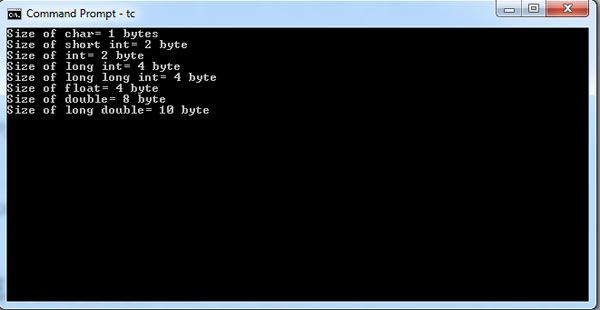The sizeof operator is another method to determine the storage requirements of any data type of variable during the execution of a program. For example, we can use the expression.
sizeof(int)
to determine the storage requirements of an int variable on our computer. The operator sizeof can also be used on any variable as shown in the example below.
int kk;
printf(“sizeof(kk) = %d bytes”, sizeof(kk);
The sizeof operator precedes either a variable name OR a datatype name. For example, if x has been declared to be a float variable, then both the expressions given below will yield the number of bytes required to store a float variable.
sizeof (x)
sizeof (float)
using sizeof with a variable name
using sizeof with a datatype
The program, given below will provide the information about the storage of various data types on your C compiler.
#include <stdio.h> void main() { printf( "Size of char= %d bytes\n", sizeof(char)); printf( "Size of short int= %d byte\n", sizeof(short)); printf( "Size of int= %d byte\n", sizeof(int)); printf( "Size of long int= %d byte\n", sizeof(long int)); printf( "Size of long long int= %d byte\n", sizeof(long int)); printf( "Size of float= %d byte\n", sizeof(float)); printf( "Size of double= %d byte\n", sizeof(double)); printf( "Size of long double= %d byte\n", sizeof(long double)); printf( "Size of enum = %d byte\n", sizeof(enum)); }

 Dinesh Thakur holds an B.C.A, MCDBA, MCSD certifications. Dinesh authors the hugely popular
Dinesh Thakur holds an B.C.A, MCDBA, MCSD certifications. Dinesh authors the hugely popular